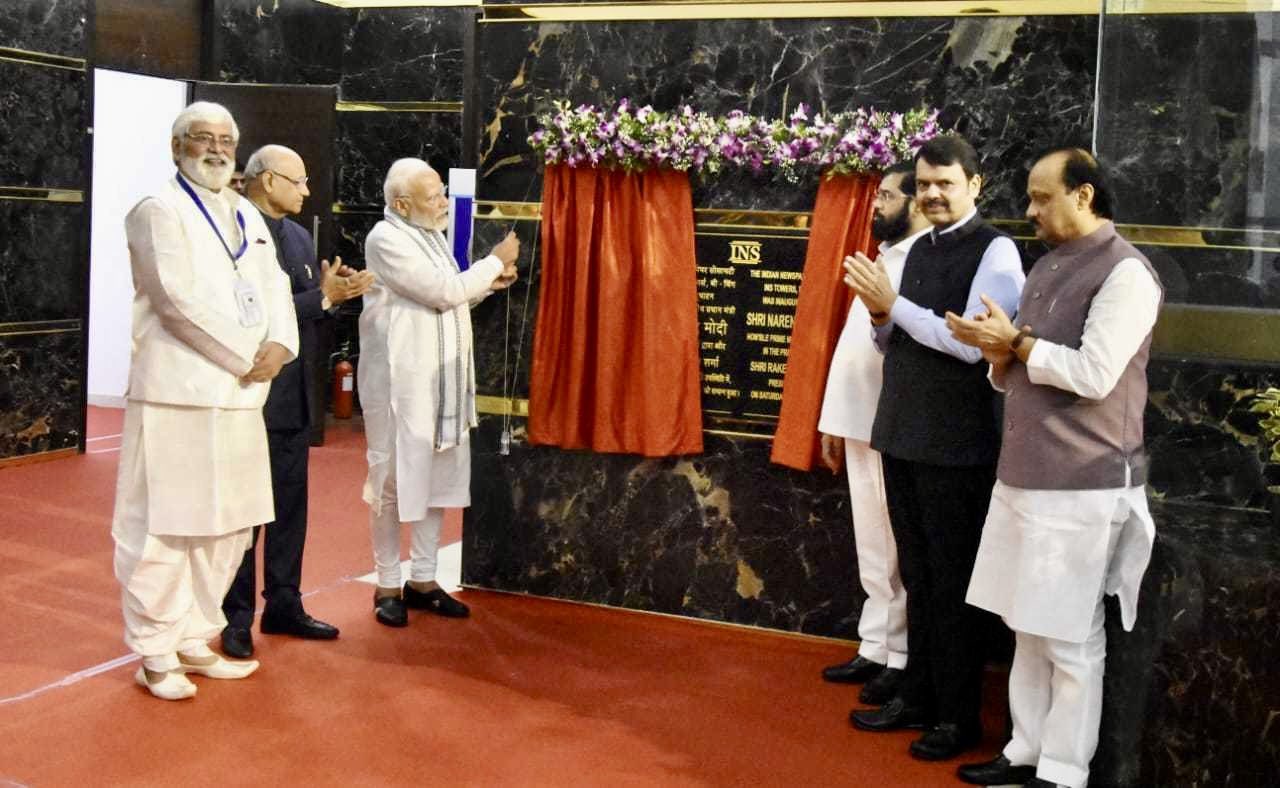Mumbai: Prime Minister Narendra Modi inaugurated the INS Towers during his visit to the Indian Newspaper Society (INS) Secretariat at G-Block, Bandra Kurla Complex, Mumbai, today. The state-of-the-art building aims to meet the evolving needs of INS members, providing modern and efficient office space and serving as a nerve center for the newspaper industry in Mumbai.
Addressing the gathering, Prime Minister Modi congratulated all members of the Indian Newspaper Society on the inauguration of the new tower. He expressed hope that the new space will enhance the ease of working, further strengthening India’s democracy. Highlighting the INS’s formation before independence, Modi noted that the organization has not only witnessed but also communicated the nation’s journey through its ups and downs.
“The media is not a mute spectator of the nation’s conditions but plays a major role in changing them,” said the Prime Minister, underlining the media’s role in the next 25-year journey towards Viksit Bharat. He emphasized the importance of newspapers and magazines in creating awareness about citizens’ rights and potential. Citing the success of digital transactions in India, Modi remarked on the confidence of Indian citizens in achieving great success, drawing interest from major nations in India’s digital public infrastructure.
Modi acknowledged the media’s partnership in these successes and its natural role in creating discourse by discussing serious issues. He highlighted the impact of government policies on the media’s functioning, using financial inclusion through Jan Dhan Yojna as an example, which integrated about 50 crore people with the banking system. This initiative, he noted, significantly supported Digital India and efforts to curb corruption. He also praised the media for promoting movements like Swachh Bharat and Startup India, which transcended vote bank politics and became part of the national discourse.
Emphasizing the influence of the INS in directing the country’s media, Modi pointed out that government-initiated events and ideas often become nationwide campaigns. He mentioned campaigns like Azadi Ka Amrit Mahotsav and Har Ghar Tiranga, initially launched by the government but embraced by the entire nation. Similarly, he highlighted the government’s emphasis on environmental protection as a humanitarian issue, referencing the globally discussed ‘Ek Ped Maa Ke Naam’ campaign introduced at the G7 Summit.
The Prime Minister urged media houses to support such initiatives for the betterment of future generations. “I urge media houses to take forward such initiatives as an effort towards the nation,” he said. Modi also underlined the media’s role in celebrating the 75th anniversary of India’s Constitution, enhancing citizens’ sense of duty and awareness towards it.
Modi suggested that tourism needs collective branding and marketing, proposing that newspapers promote the tourism of a particular state each month to foster mutual interest among states. He also encouraged newspapers to enhance their global presence, noting India’s impending status as the third-largest economy and the importance of projecting the country’s success internationally. Modi mentioned the significance of the Indian diaspora and wished for the expansion of Indian publications in all UN languages, facilitated by AI.
Concluding his address, the Prime Minister urged media houses to leverage digital editions of their publications, which do not face space constraints like printed editions, and consider the suggestions presented. “I am sure that all of you will consider these suggestions, do new experiments, and strengthen India’s democracy. The more strongly you work, the more the country will progress,” he concluded.





